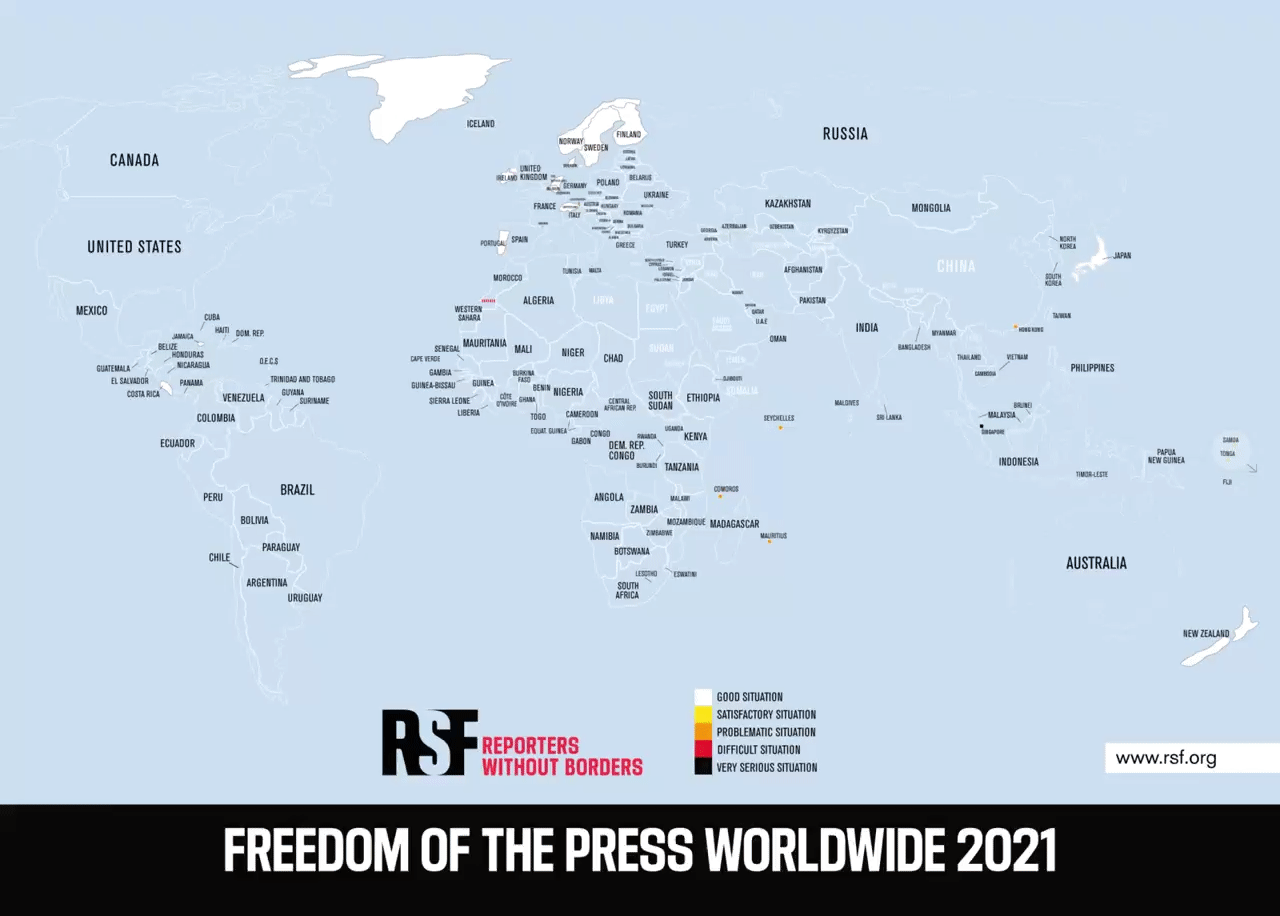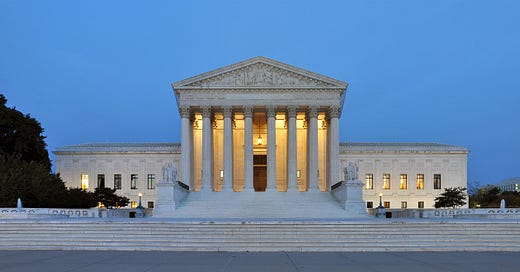A Cheerleader Goes to the Supreme Court
The Supreme Court considers a major First Amendment case
I’m Scott Nover. Welcome back to Pressing, a newsletter about press freedom. If you haven’t yet subscribed, you can do so here and receive this letter in your inbox every Tuesday morning.
This is the 71st issue of Pressing and it’s great to have you with me. Please send me feedback, thoughts, suggestions, and tips at sgnover@gmail.com.
A Cheerleader Goes to the Supreme Court
“Fuck school, fuck softball, fuck cheer, fuck everything,” Brandi Levy posted on Snapchat in 2017. That post on social media—made on a weekend, outside of her public school’s grounds—is now the subject of a major First Amendment case in the hands of the Supreme Court.
Tomorrow, the Supreme Court’s nine justices will hear oral arguments for Mahanoy Area School District v. B.L., the case concerning whether the Pennsylvania school district violated Levy’s constitutional protections in suspending her from the school cheerleading squad for her off-campus comments.
The Court precedent that most directly applies is the 1969 case Tinker v. Des Moines, in which the justices ruled in favor of Mary Beth Tinker, a public school student in Iowa who wore a black armband to school in protest of the Vietnam War. The ruling established the Tinker test, which determines whether student speech is substantially disruptive insomuch that a public school administration can stifle that speech in the name of preserving order at the school. You may recognize this quote from Tinker:
“It can hardly be argued that either students or teachers shed their constitutional rights to freedom of speech or expression at the schoolhouse gate.” — Tinker v. Des Moines (1969)
Levy has won in federal district court and federal appeals court, so the Court’s decision to hear it is rather worrying for me and others who hope Levy wins out.
Frank LoMonte at the University of Florida argued most eloquently in favor of Levy in a recent Slate article:
It is one thing to say that a school can dictate how students speak to one another in class, but quite another to say that it has equal authority to dictate how students speak to the entire world, and that all speech must always be suitable for the classroom.
This proposition is clear in normal times, but we are certainly not living in normal times. The Zoom-ification of public school presents an interesting contextual challenge for Levy and her legal team at the American Civil Liberties Union. With students behind screens, could an off-screen activity disrupt virtual school? Potentially. But, the context of this case is crucial. This is speech that happened away from school on a weekend in 2017—and Levy was punished for it.
Other opponents of Levy, including the Biden administration for some reason, assert that restricting schools’ abilities to censor speech also limits their abilities to prevent harassment and bullying. Here’s LoMonte:
That’s nonsense. Speech that is severe enough to violate state bullying laws is already unprotected by the First Amendment, which allows the government to punish harassment.
Judge Cheryl Ann Krause, an Obama appointee on the Third Circuit, which upheld the district court opinion, implied that a victory for the school district would curb students’ free speech rights in all walks of life, a troubling idea in a time when teenagers engage in an ungodly amount of digital communication every day outside of school.
“New communicative technologies open new territories where regulators might seek to suppress speech they consider inappropriate, uncouth, or provocative,” Krause wrote. “And we cannot permit such efforts, no matter how well intentioned, without sacrificing precious freedoms that the First Amendment protects.”
LoMonte says that the Levy decision will almost certainly impact public college and university students too. “Every time the Supreme Court has decided a First Amendment case at the K–12 level, college lawyers have raced to court and convinced judges to afford them the same level of control,” he said.
“Regardless of how the Supreme Court may hedge its opinion, the reality is that Levy’s case will set the standard for adult-age college students for decades. And while losing a year of extracurricular activities might be survivable for a 14-year-old, it could be devastating for a 19-year-old. Being kicked off a sports team can mean losing free college tuition, a place to live, a meal plan, and health coverage.”
Wednesday will bring oral arguments for Levy’s case. Every student and parent who relies on America’s public schools should pay attention.
If you would like to donate to keep Pressing going, you may do so through a “paid subscription” below. Or you can “buy me a coffee” through this link. Pressing is a free newsletter, but any contributions allow me to keep producing this newsletter for everyone each week.
World Press Freedom Day Is On May 3


Remembering Chris Hondros and Tim Hetherington 10 Years Later
Ten years ago, the targeted killings of photojournalists Chris Hondros and Tim Hetherington in Libya sent shockwaves through media and human rights circles. Hondros was a two-time Pulitzer finalist and Hetherington was an Academy Award nominee for his documentary Restrepo, which he directed with Sebastian Junger.
CNN: Opinion: A decade later, Tim Hetherington's work lives on (Peter Bergen)
Time: What We Learned From Chris Hondros and Tim Hetherington (Olivier Laurent) - From 2016
Voice of America: How Arab Spring Changed Culture of Journalist Safety (Sirwan Kajjo, Ezel Sahinkaya, Namo Abdulla)


In Other News:
CNN: Hong Kong's press freedom is under attack (Kristie Lu Stout)
Committee to Protect Journalists: Colombian journalist Luis Carlos Ayala survives shooting
Committee to Protect Journalists: Uzbek journalist Sid Yanyshev charged over corruption reporting
Minneapolis Star-Tribune: Opinion: Minnesota should be America's 'Nordic model' on press freedom (John Rash)
The New Republic: The Supreme Court Could Get Dragged Into the Cancel Culture Wars (Matt Ford)
Politico: Facebook oversight board's newest member voiced skepticism about Trump ban (Cristiano Lima)
Reason: How Press Freedom—and Section 230—Led to Derek Chauvin's Conviction (Nick Gillespie)
The Wall Street Journal: China Censors ‘Nomadland’ Director Chloé Zhao’s Oscar Win (Liza Lin)
The Washington Post: By bearing witness — and hitting ‘record’ — 17-year-old Darnella Frazier may have changed the world (Margaret Sullivan)
New Press Freedom Index
Reporters Without Borders recently released its World Press Freedom Index, an annual ranking every country by media freedom. The United States fell one spot to 44th as Norway held its number one spot for the fifth year running.


Axios: Global press freedom deteriorates amid pandemic (Dave Lawler)
Politico Europe: European states slip in media freedom rankings amid rising violence (Lili Bayer)
Thanks for reading Pressing today and always. Like what you read and want to support me? Consider donating via a paid subscription here. I’ll see you next Tuesday! Send tips and feedback to sgnover@gmail.com.



